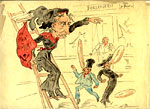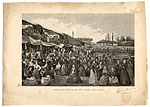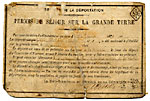Louise Michel biography
Louise Michel was born on May 29, 1830, in an austere castle called Vroncourt (Haute-Marne) where her mother, Marianne Michel, was a maidservant. Her father was reputed to have been Laurent Demahis, the owner's son, but her father may have been the owner himself, Etienne-Charles Demahis. Anyway, her grandparents raised her as a Demahis, and she received a liberal education from them. Her grandfather had her read Voltaire, Rousseau, and the encyclopedists, and her grandmother taught her to sing and play piano. Louise Michel's Mémoirs describe her early years as idyllic. In 1850, following her grandparents' and father's deaths, her stepmother drove her from the castle.
She was forced to look for a way to earn her own living. She chose to become an elementary teacher and so attended a teacher's training academy in Chaumont. In 1852, after obtaining her diploma, she opened a private school in Audeloncourt, not far from Vroncourt. But many parents didn't like her methods: she took her pupils outdoors so they could discover nature and she also taught them to sing the Marseillaise. These actions led to her repeatedly being called to the Préfet's office for a reprimand. Later, together with her friend Julie Longchamp, whom she had met in Chaumont, she opened a girl's school in Millières, where she taught for two years.
In 1856 she went to Paris, which always attracted her, to teach in a pension. Nine years later, she bought a private day-school in Montmartre. In this period she attended political meetings, where she met Théophile Ferré and his sister Marie, and became violently anticlerical. She also opposed the Second Empire. On July 12, 1870, along with 100,000 others, she went to the funeral of the journalist Victor Noir, who was killed by Pierre Bonaparte. Afterwards, in July, Napoleon III declared the war on Prussia. His troops were quickly overcome and he became a prisoner.
The Third Republic was proclaimed on September 4, and soon thereafter the Prussians lay siege to Paris. She tried to keep her school open and find food for her students. Her friend Georges Clemenceau, Mayor of Montmartre, helped her.
Louise Michel was very politically engaged in this period; she even created with friends Le Comité de Vigilance des Citoyennes du XVIIIème arrondissement [the Vigilance Committee of the eighteenth arrondissement]. When the bourgeois republic tried to forcibly disarm Parisians, it led to the proclamation of the Paris Commune on March 28, 1871. Louise Michel became an ambulance nurse and soldier, belonging to the Montmartre sixty-first battalion. She was everywhere where she could feel the danger. Finally, she surrendered on May 24 because the Versaillais - current name of the authorities who were refugees in Versailles - arrested her mother and threatened to kill her. Her mother was then released, and Louise Michel was incarcerated in Satory prison.
After having defended herself in court, on December 16, 1871, at the age of 41, she was condemned to be deported. While awaiting deportation to New Caledonia, Louise Michel and other prisoners from the Commune were imprisoned in Auberive (Haute-Marne). These included Beatrix Excoffon and Nathalie Lemel. On August 28, 1873, she embarked on the Virginie, arriving four months later at the fortress of Numbo, in the Ducos peninsula. Although life was difficult there, especially with respect to hygiene and food, she enjoyed it. When she was moved to West Bay, in May 1875, she came in contact with the native people and taught them to read and write. She even helped them withstand the French authorities. But she also assisted to their defeat. Later, in 1879, she left West Bay for Nouméa to become a teacher. In the years in exile she became more receptive to anarchist thoughts.
Following the general amnesty for Commune prisoners, she returned to France. At that time, her mother just had a paralysis attack. Louise Michel was triumphantly welcomed by 10 000 persons on November 9, 1880, at St Lazare station in Paris. In this period she attended many meetings in France and abroad, where she spoke about her struggle for Social Revolution and anarchism. While such meetings were expensive, Louise Michel viewed them as a way for the middle-classes to contribute to the workers.
On March 9, 1883, she and Emile Pouget led a demonstration of unemployed workers. She was arrested a month later and imprisoned in St Lazare. Again she defended herself at the trial, but was sentenced to six years in prison. She was transferred to the Clermont detention center (in Oise), which was strictly directed by Versaillais . However, in December 1884, she was authorized to join her mother's bedside thanks to her friends Clemenceau, Rochefort and Vaughan. Her mother died on January 3, 1885. Louise Michel was released a year later, when she was 56.
The next five years were spent alternating between attending meetings or in prison. There was even an attempt on her life during a meeting in Le Havre, in 1888, when the extremist Pierre Lucas shot her, but she quickly recovered. In 1890, tired of the gossip and calumny against her, she moved to London. Five years later, her friend Charlotte Vauvelle, who came from the anarchist circle of London, joined her and became a very precious help in her movings. She began to teach again and to lecture. She also gave free lessons of French. As an anarchist, she agreed with the anarchists' attempts in France. In the last ten years of her life, she traveled between London and Paris, participating in many political meetings and conferences. She also visited comrades in the Netherlands and Belgium. She died in Marseille on January 9, 1905, while on a lecture tour in the south of France.










